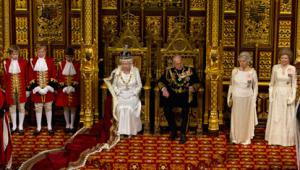The Queen said prison governors would gain wider freedoms over how they run their institutions, in particular in relation to prisoner education.
“Old and inefficient prisons will be closed and new ones built where prisoners can be put more effectively to work,” she said.
There would also be action taken to provide better mental health care within the criminal justice system.
Elaborating on the prison reforms heralded in the Queen’s Speech, the Ministry of Justice said six institutions would be designated as ‘reform prisons’ – Wandsworth, Holme House, Kirklevington Grange, Coldingley, High Down and Ranby.
These would be the first to gain financial and legal freedoms, including over how the prison budget is spent, opt-outs from national contracts and operational freedoms over education, the prison regime, family visits, and work and rehabilitation services.
Governors would be held to account through publication of comparative data on rates for reoffending, employment on release, and violence and self-harm.
Prisons will become independent legal entities with powers to enter into contracts, generate and retain income and establish their own boards with external expertise.
Prime minister David Cameron said: “For too long, we have left our prisons to fester. Not only does that reinforce the cycle of crime, increasing the bills of social failure that taxpayers must pick up. It writes off thousands of people.”
The reforms would mean prisons would “no longer be warehouses for criminals; they will now be places where lives are changed”, he added.
The speech emphasised a government commitment to technology, with a promise of a right for every household to access high-speed broadband, and for the UK to become a world leader in digital industries and technologies, including self-driving and electric vehicles.
It also referred to continued support for the Northern Powerhouse and devolution of powers to directly elected mayors, singling out controls over local bus services.
A Local Growth and Jobs Bill will deliver the “biggest change in local finance for a decade”, allowing local authorities to retain 100% of business rates they collect. It will also include new measure to allow combined authority mayors to levy business rate supplements to fund infrastructure projects where there is local business support for this.
Other commitments included building a million homes, legislation to tackle corruption, money laundering and tax evasion and an unspecified “fairer balance in national funding formula for schools”. The Education for All Bill will expand the academies programme in the poorest performing local authority areas and make schools accountable for the provision and progress of excluded pupils.
The government also said it would spend 2% of national income on defence and honour spending commitments on international development.


















